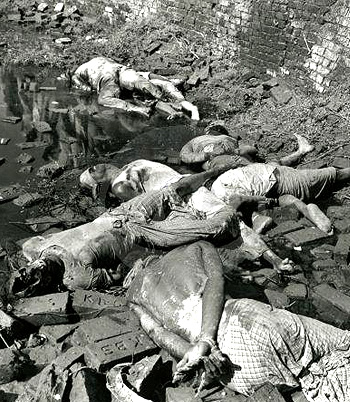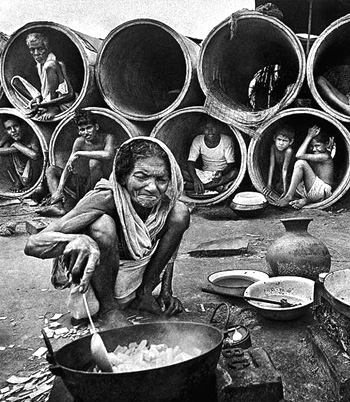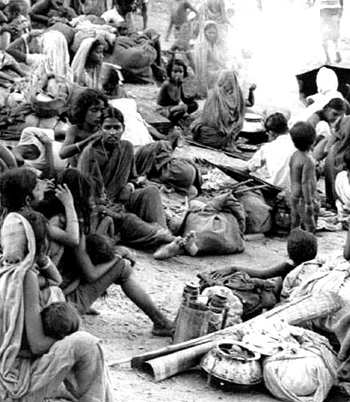“Sakkhi Banglar rokto bheja mati
Sakkhi akasher chondro tara
Bhuli nai shohider kono smriti
Bhulbo na kichhui amra”
“This blood-stained soil is our witness
So is the sky and so are the stars
We will not forget the memories of martyrs
We will not forget anything.”
On 13 June 1971, an article in the UK's Sunday Times exposed the brutality of Pakistan's suppression of the Bangladeshi uprising. It forced the reporter's family into hiding and changed history.
Written by Anthony Mascarenhas, a Pakistani reporter, and printed in the UK's Sunday Times, it exposed for the first time the scale of the Pakistan army's brutal campaign to suppress its eastern province in 1971.
The genocide in Bangladesh began on 26 March 1971 with the launch of Operation Searchlight, as West Pakistan (now Pakistan) began a military crackdown on the Eastern wing (now Bangladesh) of the nation to suppress Bengali calls for self-determination rights. During the nine-month-long Bangladesh War for Liberation, members of the Pakistani military and supporting Islamist militias from Jamaat-e-Islami killed between 300,000 and 3,000,000 people and raped between 200,000 and 400,000 Bangladeshi women, according to independent International sources, in a systematic campaign of genocidal rape. The actions against women were supported by Jamaat-e-Islami religious leaders, who declared that Bengali women were gonimoter maal (Bengali for "public property").
The International Commission of Jurists, who conducted an enquiry, concluded that a campaign of genocide involved "… the indiscriminate killing of civilians, including women and children and the poorest and weakest members of the community; the attempt to exterminate or drive out of the country a large part of the Hindu population; the arrest, torture and killing of Awami League activists and students, professionals, business men and other potential leaders among the Bengalis; the raping of women; the destruction of villages and towns."
In 1981, UN's declaration of Universal Human Rights writes; "Among the genocides of human history, the highest number of people killed in lower span of time is in Bangladesh in 1971. An average of 6000 (six thousand) to 12 000 (twelve thousand) people were killed every single day..........This is the highest daily average in the history of genocide's." The occupation army of Pakistan committed this unholy act for an approximate period of 260 days (from the night of 25 March,1971 to their surrender on the 16th. December, 1971).
As a result of the conflict, a further eight to ten million people,fled the country at the time to seek refuge in neighbouring India. It is estimated that up to 30 million civilians became internally displaced.
Our feature documentary will delineate the horrors and the crimes committed both by the Pakistani army and the Jamaat-e-Islami religious leaders, especially of The Butcher of Mirpur, Abdul Quader Molla, through eye witness accounts, interviews with ring side leaders, senior local and international media persons who covered the horrific events, as well as academics who have researched this forgotten genocide.
All this will be supplemented with rare archival footage, photographs from the archives of news organizations like AP, BBC, the Bangladesh government, but also leading publications such as The Sunday Times, The New York Times, National Geographic.
The brutality of the Pakistani Army and the suffering of the Bangladeshi men, women and children, aroused the conscience of the world. George Harrison, of the Beatles, along with sitar maestro Ravi Shankar, put together an International Music Concert -The Concert for Bangladesh, not just to raise funds for the million of refugees, who left hearth and home, and fled across the border to India, but also to arouse the conscience of the world to this tragedy.
Senator Edward Kennedy personally flew from the USA to meet the refugees in their camps.
Apart from the main heroes of the Bangladesh liberation Bangabandu Sheikh Mujibur Rahman, we will also tell the tale of other heroes, most especially an American diplomat named Archer Blood - who risked and even sacrificed his career by refusing to knuckle under to the White House and telling the truth about what was happening on the ground.
At the time of the crackdown in East Pakistan, President Nixon and his national security adviser, Henry Kissinger, were trying to establish relations with the People’s Republic of China, which was only then emerging from the chaos of the Cultural Revolution. Nixon wanted desperately to extract the United States from Vietnam in something less than a catastrophic way and, as focused as ever on the Soviet Union, he and Kissinger believed that opening a channel to China could help them with the war while, at the same time, delivering a blow to the Soviets by exploiting their rivalry with the Chinese. Pakistan and, in particular, Gen Yahya Khan , its military leader, became Nixon’s secret liaison with the Chinese leader Zhou Enlai. Yahya helped lay the groundwork for the visits to China by Kissinger and then Nixon.
In practice, this meant that Gen Yahya - a vain, shallow mediocre man - was suddenly considered indispensable, free to do whatever he wished in East Pakistan. With the White House averting its eyes, the largely Muslim Pakistani Army killed at least 2-3 million Bengalis, and forced 10 million to flee to India.
Through this narrative and intercutting with the the 1971 War between India and Pakistan and the surrender of 90,000 the Pakistani we will tell the story of the birth of Independent Bangladesh and the release from Pakistani prison of Sheikh Mujibur Rahman.
The last part of the film will take us through the trauma the dramatic coup and brutal massacre of the Mujibur Rahman family, other than Sheikh Hasina, who fortuitously was in Germany at that time.
We will end the film with the trial of the conspirators who killed Bangabandhu and that of the Butcher of Mirpur,who received a life sentence which led to an outrage throughout Bangladesh culminating in the massive Shahbagh demonstrations, which in turn led to the Supreme Court of Bangladesh to sentence Abdul Quador Mollah to receive a death sentence. The Butcher of Mirpur was hanged on 12th December 2013.
This feature lenght documentary will be distributed in all media platforms, as well as theatrical, digital, OTT and in colleges and Unviversities all over the world.
It will use poems, songs, archival footage, rare photographs, interviews and filming in historical sites to narrate the tragic and traumatic moments from Bangladesh history.
← Back to Projects


